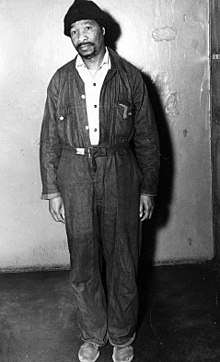Govan Mbeki
| Govan Mbeki | |
|---|---|
 Under arrest in 1963 | |
| Born |
Govan Archibald Mvuyelwa Mbeki 9 July 1910 Mpukane Location, Nqamakwe district, South Africa[1] |
| Died |
30 August 2001 (aged 91) South Africa |
| Occupation | anti-apartheid activist |
| Spouse(s) | Epainette Mbeki |
| Children |
Linda Mbeki Thabo Mbeki Moeletsi Mbeki Jama Mbeki |
Govan Archibald Mvuyelwa Mbeki (9 July 1910 – 30 August 2001) was a South African politician and son of Chief Sikelewu Mbeki and Johanna Mahala and also the father of the former South African president Thabo Mbeki and political economist Moeletsi Mbeki.
Life and work
He attended Fort Hare University, completing in 1936 a Bachelor of Arts degree in politics and psychology and a teaching diploma. Mbeki met other African struggle leaders there. He worked for a time as a teacher but lost his job because of his political activities.[2] He became a clandestine member of the communist party in the late 1930s.[3] Mbeki did not join the African National Congress (ANC) until after the communists were banned in 1950. Initially a journalist on Inkundla Ya Bantu, he left journalism in 1943 and became a government-nominated member of the Transkeian General Council until 1950. At this time he had shown no opposition to the government, otherwise he would not have been nominated to this position by the government. In 1948 Mbeki stood as a candidate for the Natives Representative Council but lost the election.[3]
In 1954, he joined the editorial board of New Age, a prominent leftist newspaper. Mbeki played a crucial role in ensuring that the pages and columns reflected the conditions, demands, and aspirations of the black peoples, particularly in the countryside.[2]
He worked with Harold Strachan in the Port Elizabeth area, and helped him produce a newsletter Izwe Lomzi ("Voice of the People").[4][5] Strachan accepted a request to improvise explosive devices for Umkhonto we Sizwe (MK),[nb 1] using substances such as potassium permanganate, magnesium, glycerol and icing sugar.[6][7][8]
...this was our job – devices and explosives. So I said, for God’s sake, why me? And they said, no well, you were a bomber pilot in the war, you see, so you must know how to make bombs. I said, but for Christ’s sake, Govan, (Mbeki) we didn’t make our own bombs. And they said, but you know about those things and I said, no, bombs were made in bloody factories, I don’t know. So he said, anyway, you’re appointed. We did a good job, actually.
— Strachan, quoted by Zoe Mulder.[9]
In November 1962, the then Minister of Justice, John Vorster, banned New Age. When the editorial board came out with its successor publication Spark, Vorster went one step further by banning not the newspaper but its editors and writers.[2]
Mbeki was a leader of the African National Congress and of the South African Communist Party. After the Rivonia Trial, he was imprisoned (1963–1987) on charges of terrorism and treason, together with Nelson Mandela, Walter Sisulu, Raymond Mhlaba, Ahmed Kathrada and other eminent ANC leaders.
On 26 June 1980, the Secretary General of the African National Congress, Alfred Nzo, announced the conferring of the Isitwalandwe Medal, the ANC's highest honour, on Mbeki. Mbeki was not present to receive the award, because he was serving a life imprisonment sentence on Robben Island.
Mbeki was released from custody after serving 24 years in the Robben Island prison on 5 November 1987. He served in South Africa's post-apartheid Senate from 1994 to 1997 as Deputy President of the Senate. He then served in the Senate's successor, the National Council of Provinces, from 1997 to 1999.
Mbeki died in Port Elizabeth in August 2001.[2] His remains were the subject of controversy in 2006 when plans were made to exhume them, and place them in a museum. These plans were called off after Mbeki's family refused the request.[10]
.jpg)
Mbeki received international recognition for his political achievements including the renaming (at Mandela's suggestion) of the recently opened health building at Glasgow Caledonian University. The Govan Mbeki Health Building was inaugurated in 2001 at a ceremony featuring his son Thabo.
Mbeki received an honorary doctorate in the Social Sciences from the University of Amsterdam.[11] His son Moeletsi attended the ceremony, as Mbeki was imprisoned at Robben Island.[12]
References
Notes
- ↑ The armed wing of the African National Congress, formed when the ANC were banned in 1960.
Citations
- ↑ "Govan Archibald Mbeki". The O'Malley Archives. Retrieved 19 December 2013.
- 1 2 3 4 "Biography of Govan Mbeki". SACP website. Retrieved 2015-09-17.
- 1 2 Mia Roth (January 20, 2016). The Communist Party in South Africa: Racism, Eurocentricity and Moscow, 1921-1950. Partridge Africa. ISBN 978-1-4828-0964-0.
- ↑ "Harold Strachan". Sunday Times. 10 May 1998. Retrieved 29 October 2017.
- ↑ Bundy, Colin (2013). Govan Mbeki. Ohio University Press. p. 101. ISBN 9780821444597.
- ↑ South African Democracy Education Trust (2004). The Road to Democracy in South Africa: 1960-1970. Zebra. pp. 121–123. ISBN 9781868729067.
- ↑ Bundy, Colin (2013). Govan Mbeki. Ohio University Press. p. 111. ISBN 9780821444597.
- ↑ Cherry, Janet (2012). Spear of the Nation: Umkhonto weSizwe: South Africa’s Liberation Army, 1960s–1990s. Ohio University Press. pp. 20–21. ISBN 9780821444436.
- ↑ Molver, Zoe (5 March 2007). "Harold Strachan: Bram's Bow-maker". literarytourism.co.za. Retrieved 30 October 2017.
- ↑ Helga van Staaden (23 January 2006). "Govan Mbeki reburial called off". News24.com. Archived from the original on 30 September 2007.
- ↑ Folia civitatis, v. 31, no. 18 (24 Dec. 1977)
- ↑ Folia civitatis, v. 31, no. 18 (24 Dec. 1977)